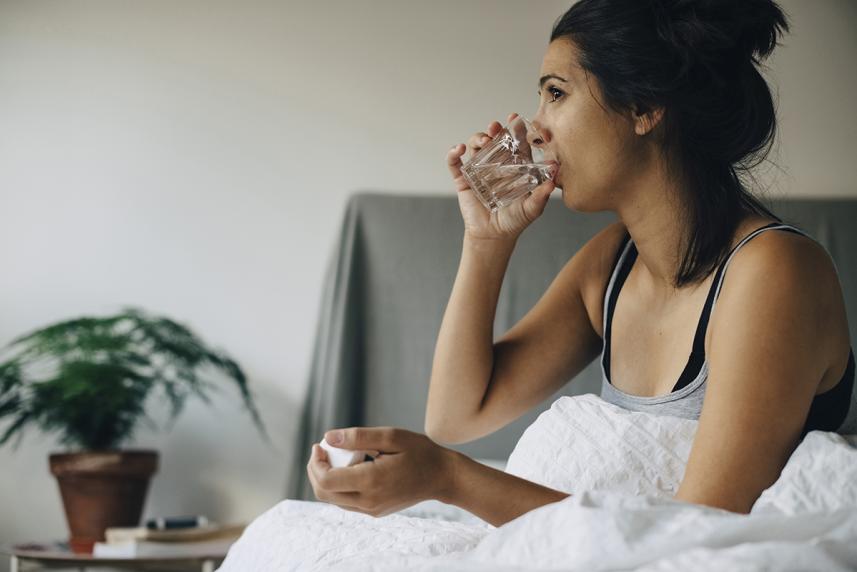
Care from the comfort of home. Affordable medications delivered to your door. Products backed by doctors at everyday low prices.

Whether you have a bout of insomnia, jet lag or just want deeper sleep, these OTC sleep aids may help.
Getting enough shut-eye is the dream. But what if you hit the pillow and can’t nod off? If you're feeling alert from jet lag, struggling with occasional sleep disruption, or just want a way to get to sleep faster, there are over-the-counter (OTC) options that may help.
However, not every OTC product is right for every person or sleep issue. Here are a few to consider and what to know about each. And always speak to your doctor before taking any OTC sleep aid.
When day turns to night, the hormone melatonin surges in your body to prepare you for sleep, making you drowsy. But if this process gets hijacked in some way — from stress or jet lag — using a melatonin supplement may be useful, according to the Mayo Clinic.
When it might help: Melatonin supplements are helpful for occasional use, as it helps reset the body's sleep signal. The best time to take it? A few hours before bedtime, when your body's levels should be peaking. "Our natural melatonin release happens around 2 to 3 hours before bedtime," says Martin Reed, a certified clinical sleep health educator in Eugene, Oregon. He’s also the founder of Insomnia Coach, a personal sleep coaching service.
A common mistake: People tend to take the supplement just before bed, which is often hours too late. “Any supplemental melatonin you might take after [your normal levels peak] is ignored by the body and it's impossible to know exactly when this natural peak occurs without lab testing,” Reed says.
When to skip it: Melatonin is not a good fit for chronic insomnia, says Reed. If you have it, you should talk to your doctor about ways to treat it. There is evidence, however, that melatonin may be helpful for what’s called delayed sleep-wake phase disorder (DSWPD), according to the Sleep Foundation.
Another note of caution: While melatonin is generally safe, it can raise blood pressure in people taking blood pressure medications. Talk to your doctor to be sure it’s a good match for you.

Care from the comfort of home. Affordable medications delivered to your door. Products backed by doctors at everyday low prices.
There are a wide range of supplements derived from herbs and roots that can help with sleep, according to Tiffany Mullen, DO. She is a functional medicine physician at Vytal Health in Milwaukee. Those include:
“These generally work by increasing the relaxing neurotransmitter GABA, gamma-aminobutyric acid, in the brain,” says Dr. Mullen. “GABA signals the brain to relax so sleep can be initiated.” Some herbs, such as ashwagandha, also work by regulating cortisol, your fight-or-flight hormone, so you’re awake when you should be and tired when you should be.
When they might help: Herbal supplements are best when you’re looking for a slow and gradual way to tackle sleep issues. Herbals are generally mild and have few side effects, unlike powerful pharmaceuticals that are potent and fast-acting. But herbal supplements may also take a few days or weeks to kick in. (The Optum Store carries a wide range of laboratory-tested supplements.)
Some supplements last longer than others in the system, adds Dr. Mullen. This is important if you’re struggling with sleep disruption rather than falling asleep. For falling asleep, she suggests a regular-release formula. But if you need help throughout the night, you may want to find a sustained-release product that can assist with staying asleep.
When to skip them: Many herbal supplements are safe, but some can interfere with medications you’re taking. For example, you shouldn’t take lemon balm or ashwagandha if you’re on thyroid medication. And if you’re already taking a sedative or a sleep medication, do not pair it with an herbal supplement that’s also meant for sleep. Be sure to talk with your doctor about anything herbal you’re considering to ensure it plays well with your medications.
(If you can't take medication or supplements, learn how therapy for insomnia can help.)
Magnesium is a powerhouse mineral and has all sorts of important roles in the body. One of those tasks is to help you regulate brain chemicals that may make you drowsy. Although the studies showing that magnesium supplements can lead to better slumber are small, a deficiency in the mineral has been linked to insomnia. The thinking is that low levels might disrupt the brain’s signaling of sleep hormones. And some people may not be getting enough through their diet, according to the National Institutes of Health (NIH).
When it might help: It’s best to get your magnesium from your diet in foods like nuts, whole grains and green leafy vegetables. But taking a magnesium supplement might be a good way to make up for the shortfall if you’re not getting enough through your diet.
It may be especially helpful if you’re an older adult, when sleep issues become more common. One study from the Journal of Research on Medical Sciences found that older adults who took magnesium for 6 weeks had improved several measures of insomnia. The benefits included the ability to get to sleep and the duration of sleep.
When to skip it: Magnesium is generally safe. But too much can lead to GI symptoms, and extremely high levels can even cause irregular heartbeat. Talk to your doctor about a safe dosage for you.
There’s a reason packages of antihistamines such as Benadryl® and ZzzQuil® contain a caution about drowsiness. Drugs like these, as well as a sleep-specific formulation such as Unisom SleepTabs, work by blocking histamine. Histamine is a chemical created in the body to trigger an immune response when an allergen (something you’re allergic to) is detected. This process has a stimulating effect, so if your system is flooding with histamines, you're likely wide awake.
When it might help: If you’re suffering from allergies and having a hard time sleeping because of them, the one-two punch of antihistamines can deliver drowsiness and deal with the effects of allergies.
When to skip it: Antihistamines — even the over-the-counter type — interact with a host of prescription medications, says Dr. Mullen. These include:
As with herbal supplements, talk to your doctor about whether any of your prescription drugs or OTC medications might interfere with antihistamines.
Even if you get the all-clear to take an OTC product, keep in mind that sleep aids and supplements are meant to offer a temporary fix. So if you find that you’re relying on them to get to sleep every night, it’s a good idea to talk to your doctor in case there’s an underlying health issue.
The Optum Store can help you stock up on everything from sleep aids to home COVID-19 tests and more. Shop now.
Additional sources
Sleep aid basics: Mayo Clinic (2019). "Sleep aids: Understand over-the-counter options"
Melatonin research: International Journal of Environmental Research and Public Health (2020). “Melatonin-Measurement Methods and the Factors Modifying the Results. A Systematic Review of the Literature”
Ashwagandha: Cureus (2019). “Efficacy and Safety of Ashwagandha (Withania somnifera) Root Extract in Insomnia and Anxiety”
GABA and stress and sleep: Frontiers in Neuroscience (2020). “Effects of Oral Gamma-Aminobutyric Acid (GABA) Administration on Stress and Sleep in Humans: A Systematic
Magnesium as sleep aid: Journal of Research in Medical Sciences (2012). “The Effect of Magnesium Supplementation on Primary Insomnia in Elderly: A Double-Blind Placebo-Controlled Clinical Trial”
Role of histamines: Frontiers in Immunology (2018). “The Role of Histamine and Histamine Receptors in Mast Cell-Mediated Allergy and Inflammation: The Hunt for New Therapeutic Targets”